Abdul Rashid is the President of Rotaract Ghana with a special commitment to the “EndPlasticSoup” project, with which we want to ban plastic waste from the oceans by 2050.
He also works in the White Volta region of northern Ghana on agroforestry – a project we support because of its huge potential for carbon sequestration to offset the CO2 emissions of our Rotary activities. Full of energy, he spends his days on the phone, WhatsApp, and online meetings. He has been invited to Berlin, Nuremberg, Amsterdam, represented West Africa at the World Climate Conference in Dubai, and is currently on his way to the United States for the international meeting of Rotary International’s Water, Sanitation, and Hygiene Task Force. Well-connected and well-known, I have no doubt that he will continue to hold important positions in and for Africa. We have become friends, and we never run out of things to talk about.

He has booked in for Thursday ‚5pm‘ and is leaving Accra in the morning, where he has successfully applied for a US visa. I don’t expect him until 8pm. My cook has already cooked for two people, a whole family, and is beaming with joy as she brings me an original Ghanaian menu, „this is cassava“ – the root of the manioc plant, similar to the sweet potato and undoubtedly the national dish (which for us is the potato). Gabbie, the cook, and her guest, Dr Ralf, have a completely different, incompatible goal. I wanted to lose weight and was thinking of losing 5kg in 4 weeks. She, on the other hand, wants to avoid this at all costs and is even thinking about gaining a certain amount of weight. At the moment I’m quite far ahead, with „abdominal discomfort“, no hunger and other irregularities, possibly due to the Malarone, the malaria prophylaxis. Apart from this basic question we get on well, she is the wife of the medical director and looks after the guests from Europe, gynaecologists, urologists, surgeons – there is always someone here.
At the estimated time of arrival, 8pm, Abdul sends a text message saying he is not coming. But he’ll be in touch tomorrow morning.
He arrived in Nkawkaw at 8 pm, but it was Saturday and not Friday. The car didn’t move, he had to wait for hours and the journey lasted into the night. I am very happy to take him in my arms. Let’s get started: he really wants to help me clean up the plastic on the hospital grounds and, most importantly, he wants to be there. My beer stash is safe and he doesn’t drink alcohol. With a big appetite he starts the family dinner. No leftovers today.
It’s like that: she brings big meals that you can’t finish. But I don’t want to insult her. Do you remember when you were a child and an aunt cooked for you with great expectations and love? You can’t eat it and you can’t give it back. You have to think of something else. I’ll be right back…
On Friday morning I became a participant and witness in my first big meeting. Sister Ruth, Abdul and Jude, the strong hero, the snake killer and the head of „maintenance“ were present. The GRVD sent me a detailed letter about the cultural differences between Ghana and Germany. A big one is that organisational meetings are not short, precise and goal-oriented, but have a great social meaning: it’s about togetherness. Our goal was to prepare the plastic clean-up on the hospital grounds. I had a financial commitment from EndPlasticSoup (Marja Ritterfeld) and the impression that we would prepare the whole thing in a solution-oriented way in a maximum of 30 minutes. Based on the advance information I expected it to take an hour. It was 3 ½ hours. And I enjoyed the time. It was only when two nuns from the convent dropped by to check on their diabetes medication and Reverend Father Derick stopped by on his way to play volleyball that the meeting began to wind down. What can I say: without any significant progress in the organisation. We’re supposed to start next Saturday at 6:30 a.m. I’m excited, not sure how it’s going to go, but full of confidence. „I take the plough with empty hands“ is my current koan. Where better to find out than here?
In the afternoon, Abdul wants to go to the big mosque to pray. I’m happy to go with him so that Friday doesn’t become too long for me.
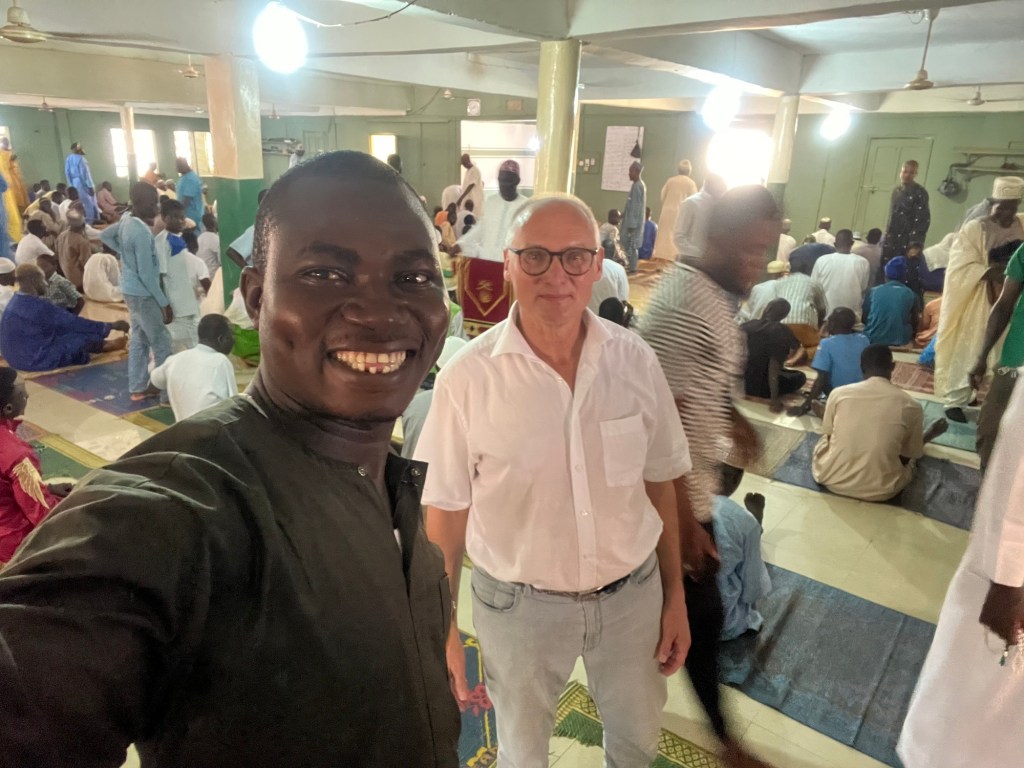
We run, it’s hot. The children’s „obroni, obroni“ can be heard everywhere, „a white man, a white man“! There are people everywhere in their colourful clothes, some breathtakingly beautiful, others with poverty written all over their faces. Modern people with gold branded glasses and watches, bags. Street vendors with heavy loads on their heads weave between the stinking, honking cars, trying to sell their goods, drinks, bread and eggs. Full sun, full weight, few customers, lots of competition.

The small town has its own very loud sound. Drivers of cars and tricycles are always honking. Rhythmic, thumping music comes from the many jukeboxes, and somewhere, someone is giving an extremely penetrating speech. It’s not uncommon to see a single, agitated gentleman with a microphone in front of his oversized speakers. No one seems to be listening to him, no one is bothered by the noise. I’d like to know what he’s so upset about.
There are cars and tricycles all over the place in a random chaos, making their way without any accidents as far as I can tell.

Street kitchens with unsightly types of meat that were unfamiliar to me, something with belly fat and mesentery and glands. Abdul really wants me to try it, it’s so delicious. I think if it works that way, I’ll have abdominal discomfort later.

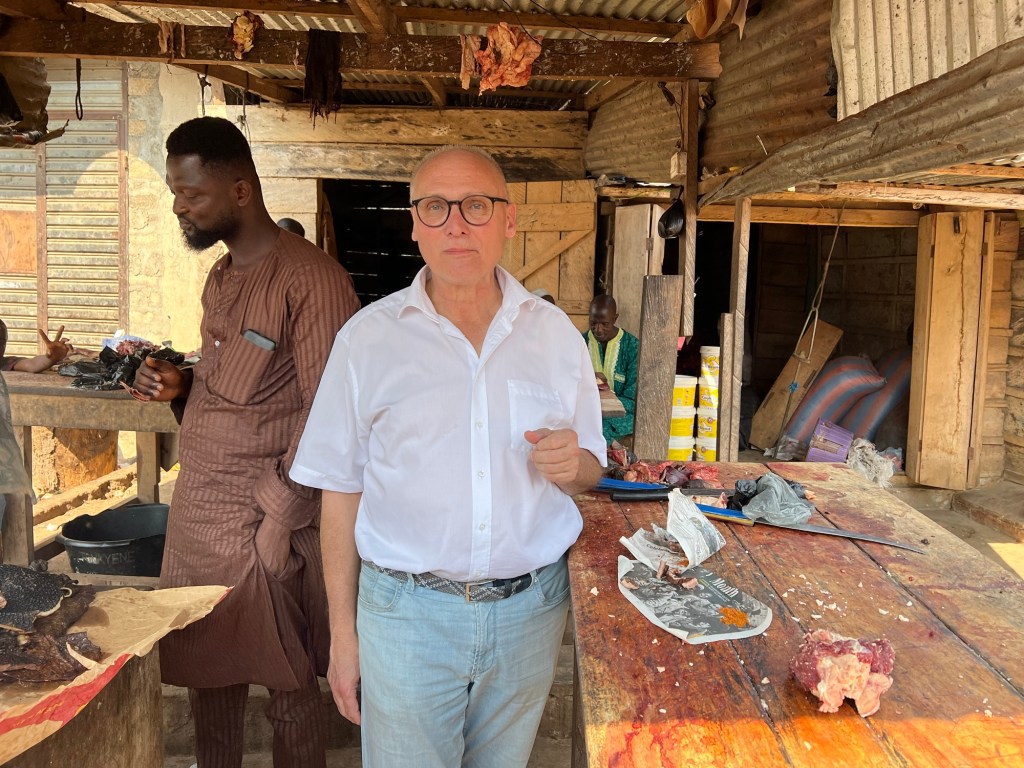
Impressed by the colours, smells, images and sounds, I walked through Nkawkaw, African life in great intensity, there were no other Obrunnis on the way.
Shoes off. The mosque is packed. Children were running around, otherwise mostly young men in deep prayer, heading east. I try not to attract attention or be a nuisance. The imam prays first in Arabic, then the faithful. Done. It won’t be long before we leave again, never in front of those who are praying. A photo, a handshake with the officials.
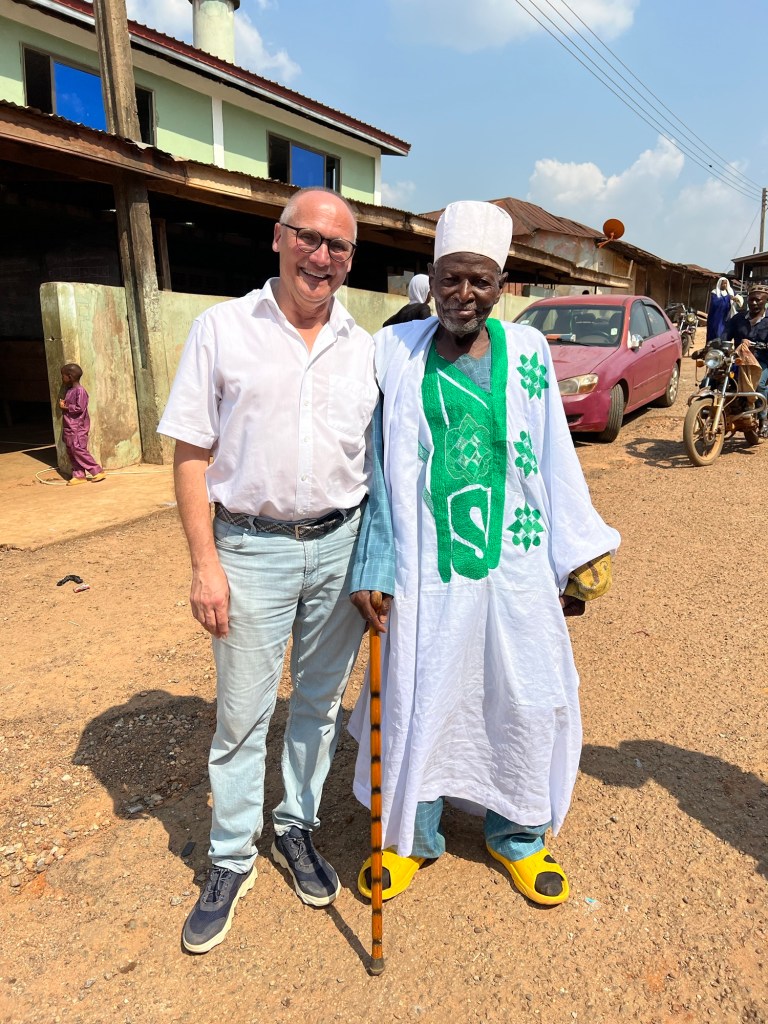
Hundreds of children are waiting outside and we give them a big can of lollipops. Big, really big turbulence until a strict gentleman with a long black kaftan and a nasty bamboo stick ensures order. All lined up in a row! Some people can’t stand it, they rush forward, the spiritual Lord strikes violently. That it hisses and claps and the little ones cry.


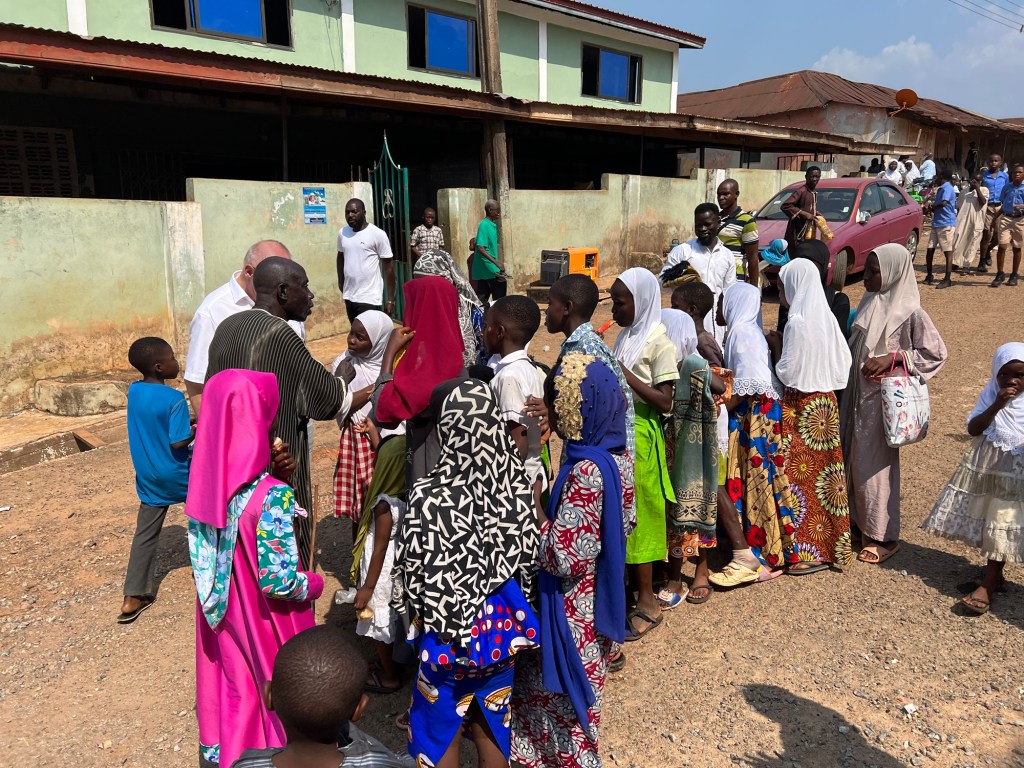
Abdul is keen to show me the Ghanaian supermarket par excellence, Melcom, and keeps taking pictures of me in the store. I have to visit all four floors, choose between all the goods, shop and find nothing but these wonderful British „London Shortbread Biscuits“.

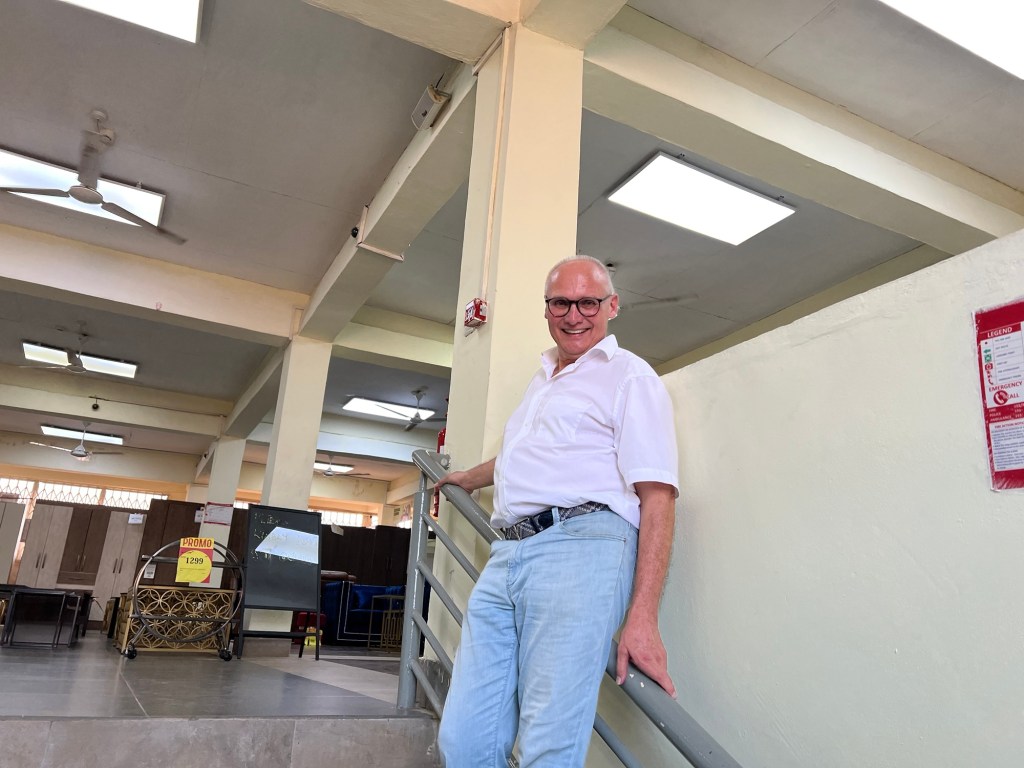
It’s an intense Nkawkaw experience that I’m immersing myself in with Abdul’s support. Same planet, completely different world. On the way we find a local plastic collector who sells his hard plastic to a recycling company and earns his money with it. Abdul is a plastics expert: polyethylene, polypropylene, polyvinyl chloride, polysterol, polyurethane. Thermoplastics, thermosets, elastomers.
It’s not just about the plastic everywhere, the huge garbage patches in the oceans, the threatened maritime life. It’s also about huge amounts of microplastics that threaten humans and animals.
We exchange phone numbers – maybe the street vendor can use the material from our hospital cleanup. Imagine: making money with plastic waste, that could change the city. But here it is mainly cheap “single-use” plastic flying around, in large quantities but not recyclable. Plastic waste is burning somewhere. In general: there are local fires everywhere. The air quality is really bad. Only after the heavy rain was there clear visibility; sometimes you can only glimpse the beautiful green hills in the area.



Hinterlasse einen Kommentar